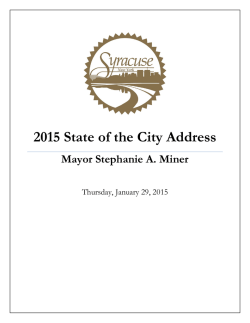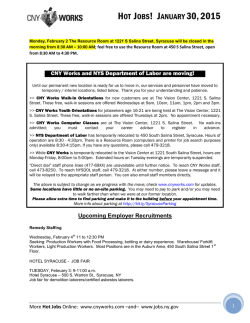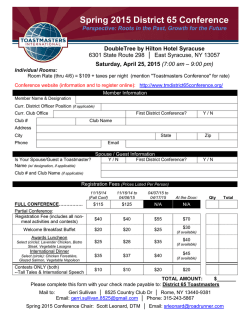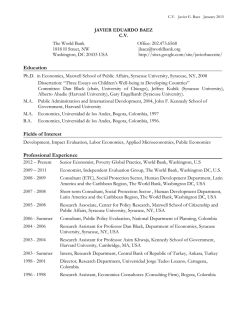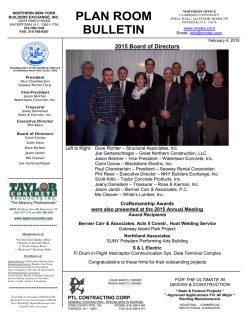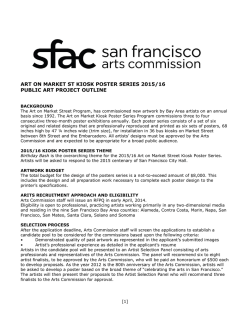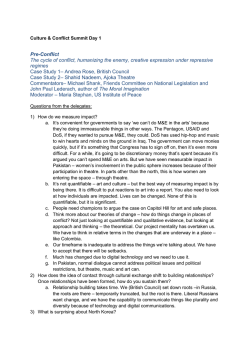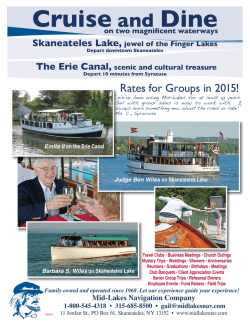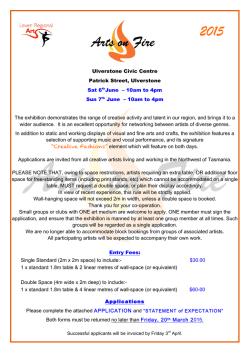
download the full RFP - Connective Corridor
Request for Proposals Sign Here: Syracuse Location: Connective Corridor - Syracuse, NY Funding: $150,000 for an estimated five to six installations Submission Deadline: March 1, 2015 by 11:59 p.m. EST. Call to Artists The Connective Corridor, in partnership with The Near Westside Initiative (NWSI), is seeking artists for Sign Here: Syracuse, a largescale sign painting project to span two connected cultural districts. This solicitation seeks artists with expertise in hand-painted sign making to design and paint permanent work along a recently completed streetscape initiative in Syracuse, NY. The work should reflect historic hand painted signs, but function as contemporary visual anchors, with strong, simple typography and illustrative elements painted at mural scale, as depicted in the attached samples. The work should be informed by the physical aspects of the specific site, as well as Syracuse’s overall historical and cultural context. This is the second public art partnership between the NWSI and the Connective Corridor. In 2010 a public art project for six rusted train bridges produced a series of messages, hand-painted by renowned artist, Steve Powers, which have become iconic symbols of the City’s revival and were featured in Faythe Levine’s new documentary, “Sign Painters.” The call is open to professional artists and artist teams. Selected artists should demonstrate expertise in creative placemaking and the selection panel is interested in commissioning artists or design teams who are enthusiastic about engaging and collaborating with the university and community on finalized designs for installation. Artists may propose one installation or a thematic series of installations at sites along the Connective Corridor. Installations will become permanent public art located on properties along the Connective Corridor streetscape. Works in the City of Syracuse’s public right-of-way must be accepted, owned and maintained by the City of Syracuse through the Syracuse Public Art Commission (SPAC). Works on Onondaga County property within the City of Syracuse must be accepted, owned and maintained by Onondaga County. Finalists proposing work on private property must demonstrate property owner consent and agreement to accept and maintain the work for a period of a minimum of five years. Proof of insurance is required for all finalists 1 About the Connective Corridor and the Neat Westside Initiative Syracuse University’s Office of Community Engagement and Economic Development manages two major creative placemaking projects with scores of partners and participants -- the Connective Corridor and the Near Westside Initiative (NWSI). The Connective Corridor is an initiative of Syracuse University, the City of Syracuse and Onondaga County that embodies best practices in urban design. Partners leveraged approximately $46 million in external public/private funding to implement improvements along a two-mile urban corridor connecting the University Hill area with downtown business and residential districts. Highlights include: • New complete “green streets” with bike and pedestrian pathways to help create a more livable, walkable community; • New network of green infrastructure to capture and manage 26 million gallons of water annually through a variety of advanced technologies; • Redesigned public parks and spaces, along with landscaping and signage for key gateway nodes to central business districts, along with extensive tree planting; • A free public bus system connecting campus and community venues, with ridership numbers that have grown from 6,000 to 200,000 rides annually; • A better connected arts, cultural and heritage district, with more than 40 cultural/community venues working together to program and co-promote the district; • Public spaces featuring interactive technologies and a large-scale outdoor urban video installation; • New downtown signage, civic strip wayfinding and the development of an interactive information kiosk system designed to enhance the Syracuse experience; • More than 70 building façade improvement projects designed to augment the new complete streetscape; • Innovative lighting projects designed to illuminate the City’s iconic architecture and public spaces through a “Corridor of Light”; • A working partnership with the City of Syracuse and Onondaga County to direct investment in key urban parcels for mixed use redevelopment along the Corridor; • Collaborative design with Syracuse University faculty and students that translate multidisciplinary research and pedagogy into practice through implementation projects. The Near Westside Initiative was formed in 2006 by Syracuse University and The Gifford Foundation in partnership with the Center of Excellence and Home HeadQuarters to leverage the resources of SU, private foundations, the state, the city, local businesses and non-profits, and neighborhood residents to revitalize Syracuse’s Near Westside. SU’s Office of Community Engagement and Economic Development provides leadership to this transformative neighborhood- based revitalization initiative. The project has attracted the attention and investment of prominent national foundations and is considered one of the best in the country. 2 Highlights include: • More than 60 homes that have been built or rehabilitated; • Renovation of more than 300,000 square feet of warehouse space, creating a new home for several creative tenants including: La Casita, the city’s first Latino Cultural Center, ProLiteracy, the largest literacy organization in the world, and WNCY, the regions public broadcasting station; • Funding from ArtPlace to renovate Salt Quarters, a 4000 square foot abandoned restaurant into a thriving structure housing two apartments, three art studios, and a gallery; • Redevelopment of Skiddy Park as a showcase Onondaga County Save the Rain green infrastructure project; • Design competition and construction of From the Ground Up: Innovative Green Homes, an initiative focused on design and sustainability for single-family homes; • Creation of 601 Tully gallery and community arts center; • Development of Nojaims/St. Joseph’s Nutrition and Wellness Center, a $2.4 million project to develop “third space” where nutrition and health come together in the country’s first combined grocery store/health clinic; • Movement on Main design competition. Location of large-scale hand-painted signs Projects must be located on properties along the Connective Corridor streetscape, a two-mile urban pathway from Syracuse University to the heart of downtown Syracuse, or along the “Civic Strip” of the Connective Corridor, a loop around Syracuse’s arts, cultural, heritage, and downtown tourism/convention district. Several potential locations have been pre-identified as possible areas of interest (see separate PDF for details and photos), however artists are encouraged to explore other locations directly on the Connective Corridor route, highlighted as the red streets in the map below. Background on Syracuse, NY Syracuse is the fifth largest city in New York State, with a population of approximately 145,000 and a metropolitan area that exceeds 650,000. It is located at the geographic crossroads of the state, and the Central New York region is the gateway to popular tourism areas such as the Finger Lakes, Thousand Islands, Adirondacks and the Great Lakes. It is within a five-hour drive of major metropolitan regions in the Northeast and Mid-Atlantic, as well as Canadian cities such as Toronto, Ottawa and Montreal. Syracuse, like many post-industrial cities, is redefining itself as it shifts from a robust manufacturing industry to an innovation economy. It is emerging as a national example of urban revitalization and regional transformation, winning the U.S. Green Building Council’s Global Leadership Award for its commitment to smart growth, sustainability and civic engagement. It was also recently named America’s Best College Town by Travel and Leisure Magazine. The City of Syracuse is seeing an accelerated pattern of investment in downtown neighborhoods and business districts, with more than $350 million in new downtown investment currently underway. More than 40% of that investment activity is new residential development, and 3 downtown residential occupancy is at 99%. Downtown residential population has increased over 30% in the past three years, with much of that growth in the young professional age cohort. The city is compact and walkable, and features striking 19th century architecture that is seeing a new wave of mixed-use redevelopment. The city has a robust arts scene, with 40 museums and galleries, including the nationally known Everson Museum of Art, designed by I.M. Pei, along with live/work neighborhoods for emerging and established artists like the SALT District. Budget The Connective Corridor has allocated $150,000 for this solicitation. These funds will be split among finalists, and the amount per finalist may vary by project depending on the scale of proposals, site specifics and the nature of the work being proposed. The panel will also consider larger awards to an artist or design team for a series of installations that “connect” a number of sites thematically. Smaller proposals for modest projects will also be considered. Each award will be structured as a lump sum “design-build” commission for permanent art. Applicants should factor in all costs, including artist’s design fees, materials, fabrication, and installation (including necessary sub-contracted services). Artists are responsible for installation. Durability & Maintenance Syracuse is a snowy city and projects will be exposed to extreme temperature differentials, moisture and varied weather conditions. Proposals should reflect highly durable, UV-resistant materials that lend themselves to long-term conservation and maintenance in four-seasons. Proposals in the public right-of-way will be reviewed by the City of Syracuse’s Public Art Commission, City Engineering and the Syracuse-Onondaga County Planning Agency for conformity with city standards or maintenance and durability. Selection Process Engagement will be an important component of this project and successful applicants will work with the steering committee, comprised of university and community members, to finalize proposals. Besides submitting a Resume/CV, artists are asked to submit a personal statement that reflects why they are interested in this public art project in Syracuse and the approach they intend to bring to community engagement. RFP responses will be evaluated by a local steering committee comprised of SU staff, SyracuseOnondaga County Planning Agency staff and a representative of the downtown business community. The jury will select a cohort of finalists based upon the artist’s quality of past work, experience, and interest in specific sites, as demonstrated in the RFP. Selected artist/s work with Connective Corridor/Near Westside Initiative staff on final proposals that are site specific. Upon review of final proposals, finalists will enter into a contract process to commission and install permanent work. 4 Finalists proposing work in the public right-of-way must secure approval from the Syracuse Public Art Commission (SPAC). SPAC’s criteria can be viewed via this link: http://www.syracuse.ny.us/uploadedFiles/Departments/Planning_and_Sustainability/Public_Arts_ Commission/Content/PublicArtApplicationInstructionsandForm.pdf Installation of artwork is expected to begin fall of 2015 or spring 2016 and must be complete by June 30, 2016 to be eligible for reimbursement. Submission Details All responses must be received no later than 11:59 p.m. EST on March 1, 2015. All materials must be submitted via e-mail as a complete PDF package to Quinton Fletchall, Connective Corridor Project Coordinator: [email protected] Submission Requirements: • Current resume/CV with detailed contact information • Cover letter with artist statement that provides us with as clear a concept as possible. Is there something about a particular site, the City of Syracuse or the Connective Corridor that especially intrigues you, and how would you align that within the context of this project? Is there a perspective you bring to creative placemaking that could inform this project? Share examples of community projects you have done that illustrate this. • Examples of work with anywhere from 5 to 20 samples of past and recent work with descriptions. For descriptions of public art installations it would be helpful to include location, commissioning organization, and budget for the work submitted as illustrative examples. Incomplete applications will not be accepted. Project Timeline March 1, 2015 RFP deadline (11:59 p.m. EST) April 1, 2015 Announcement of finalists April-June 2015 Finalists work with steering committee to finalize locations and project cost July-August 2015 Preliminary Approval by Syracuse Public Art Commission for projects in the public right-of-way / Contracts developed September 2015 Fall 2015/ Review and Approval - Finalists for projects in the public right-of-way present proposals to the Syracuse Public Art Commission for approval / Contracts executed Spring 2015 Install projects June 2016 All projects complete and final invoices submitted for reimbursement. Invoices submitted after June 30, 2016 will be ineligible for reimbursement. 5 Illustrative Examples of Style and Size 6 Potential Site Locations N Connective Corridor Onondaga Creek # Site Number 1a - West Street Rail Bridge Underpass 7 1b - Fayette Street Rail Bridge Underpass 2 - Jefferson Street Wall 8 3 - Warren Street Parking Garage 4 - Monroe Building 9 5 - Tech Garden Parking Garage 6 - Power Plant Steam Stack 10 Map and photos of the Connective Corridor The following map and photos are presented as general landscapes of the Connective Corridor and adjacent neighborhoods to provide additional background resources about Syracuse and the Connective Corridor. Photos of potential art sites are above. N Connective Corridor Onondaga Creek # Photo location and direction Syracuse, NY 11 A - Armory Square Entry Park B - Onondaga Creekwalk 12 C - Clinton Square D - Urban Video Project at the Everson Museum 13 E - Forman Park F - University Hill 14
© Copyright 2026
